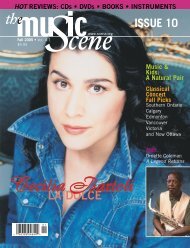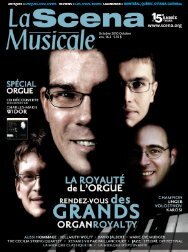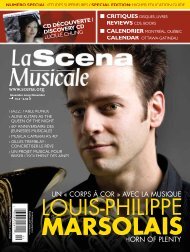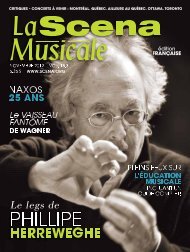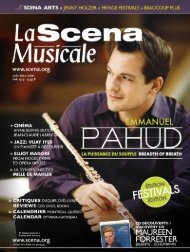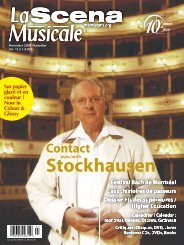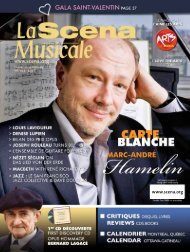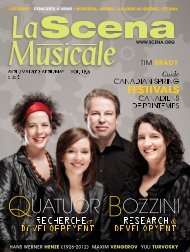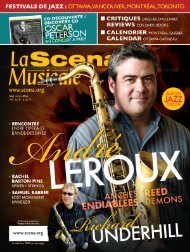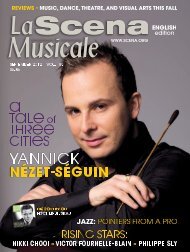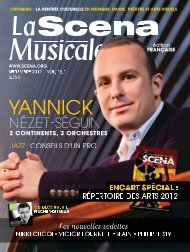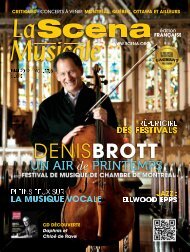Create successful ePaper yourself
Turn your PDF publications into a flip-book with our unique Google optimized e-Paper software.
CONTEST<br />
CIOC<br />
Pipe dream turned reality<br />
Christian <strong>La</strong>ne, 2011 CIOC Winner<br />
by CRYSTAL CHAN<br />
christian <strong>La</strong>ne didn’t think he’d be back. It<br />
was just around the time that he left<br />
Montreal after placing as a semi-finalist at<br />
the inaugural Canadian International<br />
Organ Competition (CIOC) in 2008 that the<br />
competition-fatigue kicked in. “I was mentally done with<br />
competitions,” he explains.<br />
Not surprising, as <strong>La</strong>ne had been playing the competition<br />
circuit with the degree of seriousness more commonly seen<br />
in his fellow keyboardists, the piano players, from a very<br />
early age. He first tried his hand at the organ at age five. He<br />
was learning seriously by grade two (he had easy access to organs<br />
while growing up, as his father was a United Methodist<br />
pastor in Hampstead, and then Walkersville, Maryland). Before<br />
turning 21, he had won four major competitions: the Albert<br />
Schweitzer OC/USA, the American Guild of Organists<br />
Region III Competition for Young Organists, the Augustana<br />
Arts/Reuter National<br />
Undergraduate<br />
OC, and<br />
the Arthur Poister<br />
National OC.<br />
He then went on<br />
to place second at<br />
the prestigious<br />
AGO National<br />
Young Artist<br />
Competition and<br />
Miami IOC.<br />
<strong>La</strong>ne, now 30,<br />
is Harvard University’s<br />
associate<br />
university organist<br />
and choirmaster;<br />
he’s been with<br />
Harvard since fall<br />
2008, where he<br />
not only plays but<br />
also teaches the<br />
repertoire of the great masters: from Frescobaldi to Messiaen. He’s<br />
also taken a keen interest in commissioning new music, especially<br />
alongside frequent collaborator, soprano Jolle Greenleaf. “I think that<br />
a good organist has to be well versed in all styles of rep,” says <strong>La</strong>ne.<br />
“Trends come and go. If you were to look at the 60s and 70s, there was<br />
a huge movement away from anything that is Romantic. It was all<br />
about performance practice, and [early music] was the only good true<br />
music. I think that that’s absurd; as organists we need to embrace our<br />
repertoire. And we are blessed with the common[ly-played] modern<br />
instrument with the widest repertoire; there are people writing really<br />
inventive music for the organ today but people also wrote for it back<br />
in the 15 th century!”<br />
Why did he jump back on the competition wagon for the CIOC? “It’s<br />
such a high class affair,” explains <strong>La</strong>ne. “They really know what they’re<br />
doing.” The Notre-Dame Basilica’s Casavant organ is “huge and fun to<br />
play.” And he was eager to meet fellow organists—some of the top in<br />
the world. All this seems more exciting to him than his winning first<br />
prize, although he acknowledges<br />
it “opens a tremendous<br />
number of doors.”<br />
“Since I’ve gotten back<br />
everybody has been asking me<br />
if I’m on cloud nine,” he continues.<br />
“And I’m not. Because<br />
for me, this is what I do—I<br />
play the organ. I set a goal: to<br />
go to Montreal and play as<br />
well as I could. But for me<br />
winning this goal isn’t this<br />
life-changing event. It’s always<br />
luck to a degree. I was<br />
shocked. I never feel like I<br />
play well enough.”<br />
He shrugs off the suggestion<br />
that, in fact, his winning<br />
so many competitions points<br />
to his playing very well, saying:<br />
“My strength is not playing<br />
all the right notes and<br />
having the most perfect technique.<br />
It’s definitely not.” He<br />
“Everybody is asking me<br />
since I’ve gotten back if<br />
I’m on cloud nine. And<br />
I’m not. Because for me,<br />
this is what I do—I play<br />
the organ.”<br />
pauses, then concedes: “But I think that I have<br />
something to say. And I know how to tame this instrument<br />
that is so untamable—even for really fine<br />
technical players.” The trick involves solving how to<br />
convey rhythm with an instrument that does not convey dynamics<br />
between notes. “So much of playing the organ comes down to finding<br />
a way to communicate through really vibrant rhythm,” he claims. “We<br />
usually perceive rhythm based on strong beats being louder, but you<br />
can’t do that on the organ. The organist must come up with ways to<br />
make the listener perceive loudness.” Techniques include holding<br />
notes on strong beats a little longer. “I think conveying that rhythm<br />
and therefore being able to communicate is probably my biggest<br />
strength,” he adds.<br />
Ultimately, communicating to others through the organ is also intensely<br />
personal. As he says: “For me, music in general and organ being<br />
one vehicle for that is how I both center myself and also have some<br />
spiritual grounding.” LSM<br />
Solo Organ Recital on May 18, 2012, at the Organix Festival in Toronto at the<br />
Metropolitan United Church www.organixconcerts.ca<br />
www.christianlane.com<br />
48<br />
DECEMBER 2011 / JANUARY 2012



